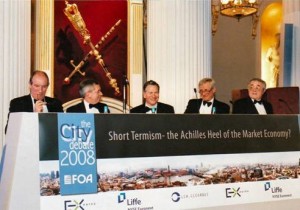Every year the FOA (Futures and Options Association) runs the City Debate,
hosted by the Lord Mayor of London at the Mansion House.
The 2008 event was held on Monday, January 28th, and chaired by Michael Portillo MP.
The Motion was: “Short Termism is bad for Business.”
Speakers for the Motion were:
Will Hutton, Chief Executive, The Work Foundation
Terry Smith, Chief Executive, Tullett Prebon
Speakers against the Motion:
Ian Angell, Professor, The London School of Economics
David Lascelles, Senior Fellow, Centre for Study of Financial Innovation
From left to right: Hutton, Smith, Portillo, Lascelles, Angell
The audience was polled prior to the debate, and the result was 55% for the motion, 33% against, 12% undecided. After a lively debate and some good knock-about interaction with the audience, the final result of the evening was 36% for the motion, 59% against, 5% undecided.
There follows the presentation made by Ian Angell:
“So 55% of you think that short-termism is bad for business. However, that does pose the question of what you mean by ‘short-term,’ and what you mean by ‘business.’ Business is NOT selling something you have, to someone who wants it. Selling something you don’t have, to someone who doesn’t want it. Now that’s business! That means business and acting in the short term are structurally coupled, and it is this coupling that creates the wealth to keep society going.
Most self-appointed curators of society don’t have the skills or the imagination for business, which is why they have always resented ‘trade.’ “Business is nothing but the struggle of wolves over carrion, men of business can hardly be saved for they live by cheating and profiteering.” So said Franciscus Gratianus, a medieval monk. Dante’s Inferno placed usurers alongside sodomites in one of the circles of hell.
 However, they need you, and so they try to dominate you. They have learned that intimidation is counter-productive, so instead they set out to make you feel guilty, using weasel words like ‘long-term instability’ and ‘unfairness’ to describe business practices. With double talk about ethics and morality, they take cheap shots at short-termism. Theirs isn’t a personal, but rather a public morality: a socially constructed bigotry; a self-referential and self-validating, codified prejudice.
However, they need you, and so they try to dominate you. They have learned that intimidation is counter-productive, so instead they set out to make you feel guilty, using weasel words like ‘long-term instability’ and ‘unfairness’ to describe business practices. With double talk about ethics and morality, they take cheap shots at short-termism. Theirs isn’t a personal, but rather a public morality: a socially constructed bigotry; a self-referential and self-validating, codified prejudice.
Through rhetoric, their thinly veiled attack on business has been transfigured … into administration … into bureaucracy … into Government. Government, the guardians of public morality! God help us!
And as for democratic Government! You don’t get much more short-termist than that. Talk about the pot calling the kettle black. Their attacks on short-termism in business are just a smokescreen to distract you from the real menace: public morality … which is their excuse for, and a precursor to, interfering: first as regulation, and then taxation. Just look at the UK’s recent ‘simplification’ of capital gains tax: numerous small businesses destroyed in this latest smash and grab raid. Your short-termism isn’t bad for business, but Government short-termism certainly is! As Ronald Regan noted, “the nine most terrifying words in the English language are: I’m from the government and I’m here to help!”
Short-termism is actually the only way that business can instill some discipline into the monopoly of government. That’s the trouble with elections, the government always wins. And using a mere body-count of the manipulated masses, they justify their holier-than-thou intolerance of business.
Don’t allow these pious commentators, these self-promoted representatives of the mob, to enforce the common good. Because the common good isn’t good, it is merely common. Recognize that public morality sees the wealth created by business as belonging to the state. So state leaders feel free to steal it, so they can subsidize preferred voters to stay in power.
As Nietzsche so shrewdly observed: “The victory of the moral ideal is achieved by the same ‘immoral’ means as every other victory: force, lies, slander, injustice.”
The control freaks predict that short-termism, with its excessive focus on immediate earnings, will discourage both long-term creation of value, and investment. What do they know? Nobel-prizewinning Physicist Niels Bohr hit the nail on the head: “Prediction is very difficult, particularly about the future”. Control is a Myth!
If your business is to survive in the long run, it must first survive in the short-term. This requires dealing with the uncertainty by steering in the flow of events. You must cope in the here and now. It’s what humans do; it’s the only game in town. Short-termism is just another word for pragmatism.
 Business operates in a self-organizing Darwinian ecology. Only the fittest survive. As a great American philosopher once put it: “You got to know when to hold ‘em, know when to fold ‘em, know when to walk away, know when to run.” Kenny Rogers is saying you should be more short-termist. Of course nurture long-term projects, but don’t get locked in. To survive and prosper you must be flexible and adaptive. If necessary, get in and out quickly – keep your assets liquid and transferable.
Business operates in a self-organizing Darwinian ecology. Only the fittest survive. As a great American philosopher once put it: “You got to know when to hold ‘em, know when to fold ‘em, know when to walk away, know when to run.” Kenny Rogers is saying you should be more short-termist. Of course nurture long-term projects, but don’t get locked in. To survive and prosper you must be flexible and adaptive. If necessary, get in and out quickly – keep your assets liquid and transferable.
Operating in the short-term is not an evil; it’s a very precious FREEDOM … the freedom to manoeuvre, not only in the face of uncertainty, but also against the self-righteous oppression of the state, and its self-legitimated violence against the creators of wealth. Be a short-termist!
With the long-term future falling apart, you’d be a damn fool to be anything else. Take advantage! All public morality is a business opportunity for the amoral. Just think how much the City of London has gained from the moral jeopardy that is Sarbanes Oxley. I won’t even mention all the Green sentimentality!
Everywhere sanctimonious authoritarians want to dominate their home turf, but they’re not in charge globally. So arbitrage! If they try to stop you profiting from short-termism over here, then go over there and do the business. Don’t get bogged down in all this government-induced guilt. To hell with the moralizers.
All commerce is about leveraging space (distance) and time. In the age of global telecomms, if you can’t act in an instant, then you’re too late! And since in the long run, we’re all dead anyway, let’s die free men and women. Long live short-termism in business. Long live freedom!”

This work is licensed under a Creative Commons Attribution 4.0 International License.
Attribution: http://www.ianangell.com

